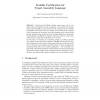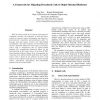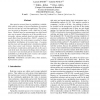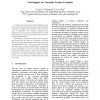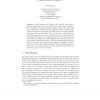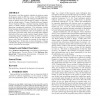141
click to vote
TIC
2000
Springer
15 years 5 months ago
2000
Springer
Abstract. A type-based certifying compiler maps source code to machine code and target-level type annotations. The target-level annotations make it possible to prove easily that th...
131
click to vote
APSEC
2001
IEEE
15 years 5 months ago
2001
IEEE
With the rapid growth of the Internet and pervasive computing activities, the migration of back-end legacy systems to network centric environments has become a focal point for res...
118
click to vote
ECOOP
2006
Springer
15 years 5 months ago
2006
Springer
Abstract. Source code querying tools allow programmers to explore relations between different parts of the code base. This paper describes such a tool, named CodeQuest. It combines...
119
click to vote
ECRTS
2004
IEEE
15 years 5 months ago
2004
IEEE
Most previous research done in probabilistic schedulability analysis assumes a known distribution of execution times for each task of a real-time application. This is however not ...
120
click to vote
ECBS
2004
IEEE
15 years 5 months ago
2004
IEEE
: The available evidence in a legacy software system, which can help in its understanding and recovery of its architecture are not always sufficient. Very often the system's d...
145
click to vote
CSMR
2004
IEEE
15 years 5 months ago
2004
IEEE
In software product families, the full benefit of reuse can only be achieved if traceability of requirements to architecture, components and further down to source code is support...
122
click to vote
FASE
2009
Springer
15 years 6 months ago
2009
Springer
Model checking tools based on the iterative refinement of predicate abstraction (e.g., Slam and Blast) often feature a specification language for expressing complex behavior rules....
113
click to vote
ECMDAFA
2009
Springer
15 years 6 months ago
2009
Springer
Model-driven engineering techniques can be used both to create new software and to modernize existing software systems. Modeldriven software modernization requires a first step for...
118
click to vote
ECOOP
2007
Springer
15 years 6 months ago
2007
Springer
Refactoring is not only useful for source code of implementations, but as well for test specifications. The open source TRex tool automates the application of refactorings and the ...
130
click to vote
ECLIPSE
2007
ACM
15 years 6 months ago
2007
ACM
We present a tool that predicts whether the software under development inside an IDE has a bug. An IDE plugin performs this prediction, using the Change Classification technique t...
